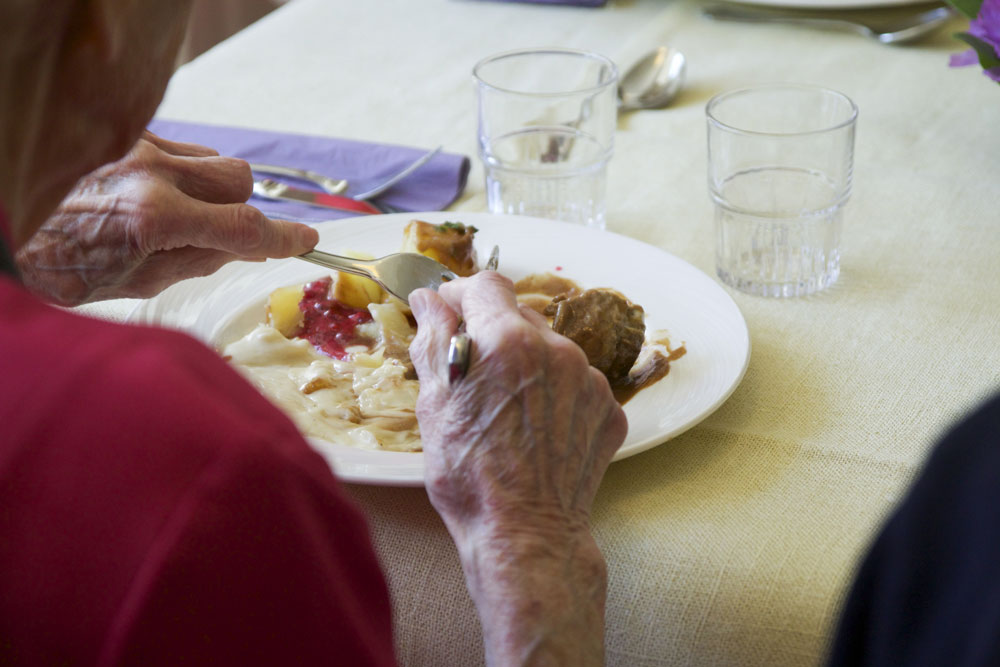Need for adapted nutritional intake
This article is written from a Swedish perspective. Hopefully, it can inspire interested individuals from other countries.
Many older people need special diets to avoid malnutrition. Special diets can be of various kinds. Consistency adapted such as timbale diet. Energy or protein-enriched diet. Diet for diabetes, allergies, or based on a religious belief. Even though people make different choices, caregivers have a responsibility to ensure that no one starves. Malnutrition and malnourishment risk leading to health damages. Doctors, nurses, and dietitians need to cooperate with nursing assistants and care workers to ensure that the resident gets the right amount of nutrition.
 Foto: Mostphotos
Foto: MostphotosSpecial Diet
There are many elderly people who eat some form of special diet due to medical, ideological, or religious reasons. Dysphagia or the need for consistency-adapted diet are other reasons. Many people with swallowing difficulties have special diets like timbale diets and thickeners in beverages.
It is a challenge to serve the right food to all residents and to do it in an appetizing way. The resident often receives a special diet for medical reasons. It could be about gluten intolerance, lactose intolerance, allergies, or disease.
There are a large number of factors to consider when it comes to the diet. Nurses have basic knowledge of nutrient intake and eating. With aging, it becomes more advanced and dieticians who are specialists in diet and nutrition are rarely easily available in elderly care.
In addition, there is consistency-adapted diet. It can be:
Coarse pate which has a chewable consistency,
Timbale with a smooth and soft consistency that is cohesive,
Jelly which has a soft and smooth consistency,
Thin-flowing which has a smooth and flowing consistency
Thick-flowing which is smooth and viscous like sour cream.
In addition to that, the diet can be a normal portion (A-diet) or energy and protein-rich (E-diet). Aging means that the need for energy and nutrients changes. The appetite and ability to eat can be hindered by physical disabilities. Dry mouth, chewing and swallowing difficulties, and impaired physical ability to eat are common symptoms.
To further illustrate the difficulties that can arise, many people develop swallowing difficulties in connection with aging. The dental hygienist regularly comes to the residence. The speech therapist's knowledge may be necessary but often requires more planning.
There are residences where some people are appointed as diet representatives and receive extra training in diet and food handling. Often at a basic level. There are nurses who deepen their knowledge of diet and nutrition out of their own interest. Dieticians, as mentioned, are a valuable asset where such exist in elderly care. Together with safe routines and knowledge among the staff, they can make a big difference for health and wellbeing.
It is important that the doctor and dietician have enough time to follow up on dietary treatments and other measures to improve nutrient intake such as tube feeding, nutritional drinks, and special diet for example in the case of swallowing difficulties. The doctor takes samples, conducts examinations, and follows up on dietary treatment in consultation with the dietician.
Energy and Protein Enriched Diet (E-diet)
Many elderly people are malnourished without it being visible on the outside. With the wrong diet, the muscles can slowly be broken down and the strength and functional ability can worsen.
Protein builds up cells and forms enzymes and hormones. Many are afraid of not getting enough protein. But the fact is that almost everyone gets more than the daily requirement of protein, as protein is found in greater or lesser amounts in almost all food. The best thing is if the protein supplement comes via the food evenly distributed throughout the day. All healthcare activities should have routines for detecting malnutrition.
The person who gets older finds it difficult to get enough, as the protein requirement increases from 0.8 grams to 1.2 - 1.5 grams per kilo body weight for ordinary elderly people. Those who are sick may need more than 1.5 grams per kilo body weight. In diseases such as urinary tract infection or if someone has difficult healing wounds, additional protein supplement is often required.
In cases of malnutrition, the diet should be energy and protein-rich. Sauces can be fortified with, for example, extra cream. Nutritional supplements can sometimes advantageously be mixed in the food. Nutritional drinks and "shots" with extra nutritional content can be served between meals. Nutritional drinks must not become a replacement for regular food. There are recipes with good homemade nutritional drinks. With a good evening snack, it avoids the night fast becoming too long. The breakfast should be versatile and may gladly contain both porridge and eggs.
Diabetes Diet
The nursing home can contribute to well-being for those living with diabetes by offering exercise and food in combination with a well-balanced medication. Wrong breakfast can ruin the day.
The balance between food, exercise, and medicine gives quality of life to those living with diabetes.
In type 2 diabetes, the diet plays a big role. With the right diet, the resident feels better and can many times manage with fewer drugs. The right diet reduces the risk of cardiovascular diseases. Actually, these dietary guidelines apply to all of us, but become even more important for those who have type 2 diabetes. Small changes in our eating habits can lower blood sugar levels and blood lipids while helping to reduce the risk of obesity.
Many of us should eat more vegetables. The National Food Agency has a "plate model" that describes how the balance should be between vegetables, grain products, and meat/fish. Fixed routines where we eat regularly are good. Extra good for those who want to change their lifestyle. Many foods have a keyhole marking that tells they are a healthier alternative than other comparable products. The keyhole means that you get less sugar and salt and more of whole grains, fibers, and healthier or less fat.
For those who have type 2 diabetes and all of us, the advice is to eat a lot of vegetables, legumes, rapeseed oil and olive oil, fish, nuts, and seeds. Cut down on candy, pastries, and snacks. Avoid soda and sweetened drinks. Coffee and tea contain protective substances that are good for diabetes. However, it should be consumed unsweetened and preferably without milk. If you want to sweeten, sweeteners are better.
Many people who have type 2 diabetes have abdominal obesity and overweight. Good eating habits can in these cases contribute to improved health. It may be good to have a little flesh, so the recommendation for weight loss does not apply to everyone.
Those who prepare breakfast must understand the diet. For example, breakfast cereals and white bread contain a lot of sugar and fast carbohydrates that raise blood sugar levels quickly. Better then with oatmeal porridge and coarse crispbread or other bread with whole grains. Root vegetables, white cabbage, and broccoli are healthier than cucumber and tomato. Peas, beans, and lentils are rich in both fibers and protein and help stabilize blood sugar levels. It can be a good substitute for pork and beef. Rapeseed oil and olive oil are better than butter and margarine.
It takes a great deal of personal responsibility to live with a chronic disease such as diabetes. In addition, high blood sugar can be more natural in older people. How we should act depends on several factors (age, life story, somatic status). As support, there is the value base for our elderly and that the care should be person-centered.
The biggest challenge is probably to work wisely with people with a dementia diagnosis. There are many traditions around coffee time and especially the older generation when it used to be set with several types of cookies. Many people appreciate good food and sweets. Compensating intake with physical exercise can be more difficult with age for various reasons. There must be an individual health plan that takes into account who you are to provide care and care and that takes into account self-determination as well as the above aspects.
In Sweden, most people eat too much salt. More than a teaspoon per day is harmful. For those who have diabetes, it carries a risk that the body will accumulate sodium which can contribute to raising blood pressure.
The brochure Diet in diabetes - A guide describes four different types of diets that have all been shown to affect diabetes positively.
Night Fast
Many people need to have an evening meal in order to feel good and sleep well. Good routines to limit the night fast are a factor in reducing the risk of malnutrition among residents. A night meal can improve sleep as we naturally become tired when the stomach is full. Some residences work with Säröbomber. The night fast should not exceed 11 hours for the elderly.
The length of the night fast matters for the opportunities to get enough energy, protein, and nutrients. Aggression at night can be due to too little nutrition during the day.
There are regulatory requirements to have routines that counteract malnutrition. The night fast should not exceed 11 hours. Where the resident does not have the ability to take their food themselves, the business should offer extra food during evenings and nights. Otherwise, there is a risk of residents suffering from malnutrition. In many nursing homes, the resident can have extra snacks in the refrigerator in their own apartment. Other nursing homes find creative solutions when they offer evening snacks or night meals.
Adapted Diet
Getting the wrong diet means health risks. Knowledge of adapted diet is necessary in elderly care. For the resident, it is about wellbeing and respect, but also a risk-preventive element in care.
There are a large number of different states and situations when the diet is adapted to the resident's needs, for example through the choice of food or consistency. Culture, religion, medication, diseases, swallowing difficulties, and allergies affect the choice of food for those who are malnourished or who risk becoming malnourished.
From a patient safety perspective, the diet is designed to contribute to symptom relief, increased well-being, and recovery. A prerequisite for optimal individual adaptation is a person-centered approach. Malnutrition is a common contributing cause of premature death among the elderly.
The choice of food shows to what extent the business respects the individual's wishes and needs. It happens, for example, that the business serves a boringly composed vegetarian dish to those who do not eat pork. If the alternatives are not thought through, they risk contributing to the resident suffering from malnutrition and that the planning of meals becomes discriminatory against those who have special needs or wishes.
For the resident, it is important that the adapted diet is good, nutritious, and cooked with care. If the food is delivered to the residence, it is important that the staff and the resident if they so wish, get information about what the food contains. When it comes to food allergies, it is important to keep different dishes separate so that no one accidentally ingests allergenic food.
Dishes may be labeled as gluten-free, lactose-free, milk-free, soy-free, nut-free, or egg-free only if they meet the requirements in the food regulations.
Reflection Questions - Need for Adapted Nutrient Intake
Nursing Assistant:
• Do you have a routine to ask the residents what they want for breakfast?
• Do you get continuing education in diet regularly?
• Do you get good information about what the food served contains?
• Do you have clear information about which residents need a special diet?
• Do routines for night meals and night fasting work?
Manager, Nurse, Occupational Therapist and Physiotherapist:
• Are there good conditions to give the residents support in eating right?
• How do you work to motivate the residents to choose healthy food?
• Do you have recurring training or reflections on how you can work together with the diet?
• Do you have a dialogue with the resident about diet and health?
• Do those who have adapted food that is cooked and served with care get the same as those who have normal food?
• Are the residents given influence over which dishes are served?
Resident and Relatives:
• Do you get good advice when it comes to diet?
• How much room for self-determination is there when it comes to choosing which food is served?
• Is there an opportunity to get something to eat between meals if you are hungry?
Erland Olsson
Specialist nurse
Sofrosyne Better care - every day

Aktuellt i media
-
2025-12-18 04:00
16 Sjukdom och död
Survivor conversations - an important element in working with next of kin
info Bild från Summer Stock
Bild från Summer Stock - 2025-12-15 04:00 17 Psykisk hälsa
- 2025-12-11 04:00 07 Riskhantering
- 2025-12-08 04:00 06 Dokumentation
- 2025-12-03 04:00 06 Dokumentation
- 2025-12-01 04:00 02 Värdegrund






